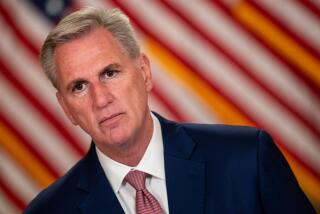Britain unveils painful budget
- Share via
Reporting from London — Britain’s new coalition government on Tuesday unveiled the country’s most painful budget in a generation, outlining a program of deep spending cuts and tax hikes in line with the mood of public austerity sweeping across Europe.
George Osborne, chancellor of the exchequer — Britain’s equivalent of Treasury secretary — said drastic measures affecting everyone were unavoidable to mollify jittery investors and tackle the nation’s biggest national deficit since World War II. The emergency budget calls for rises in sales and capital gains taxes and reductions in welfare benefits to help erase the government deficit within six years.
Osborne pledged that the austerity plan would protect society’s most vulnerable, despite immediate criticism to the contrary, and rejected arguments that such a harsh package of cuts would strangle economic growth and precipitate a double-dip recession.
“Unless we deal with our debts, there will be no growth,” Osborne told lawmakers in Parliament. “A credible plan to cut our budget deficit goes hand in hand with a steady and sustained economic recovery with low inflation and falling unemployment.”
He added that the Conservative-led coalition’s promise of tough action on the deficit had increased Britain’s “credibility in international markets.”
Britain’s decision to cut spending comes at time when governments around world are trying to decide whether to continue trying to stimulate their economies out of sluggish growth or begin paring back their rising debt levels. Last week President Obama wrote a letter to fellow leaders from the Group of 20 nations, who are meeting this weekend in Toronto, warning them against slashing programs designed to stimulate economic recovery.
Osborne’s budget suggested that Britain was not moved by his plea.
A desire to appease international markets has spurred other countries in Europe, including Spain, Portugal, Italy and Germany, to announce retrenchment plans in recent months. Their governments have been eager to win back confidence in the euro, whose value has plummeted because of investor fears of sovereign defaults.
Britain, which does not use the euro, is faced with a budget deficit equal to more than 10% of its gross domestic product and debts of more than $1 trillion.
During the lead-up to last month’s national election, the Conservatives pledged to make cutting the deficit their top priority. This month, Tory Prime Minister David Cameron began prepping his compatriots for spending cuts whose effects would be felt “for years, perhaps even decades.”
Tuesday’s budget is the harshest since the early 1980s, when fellow Tory Margaret Thatcher was prime minister.
It includes a two-year salary freeze for most public sector employees, a sped-up timetable for raising the retirement age to 66 and reductions in certain welfare benefits. Except for healthcare and foreign aid, all government departments will be expected to make deep cuts, although specific programs on the chopping block won’t be known until October.
To bring in more money, the government plans a modest rise in capital gains tax for high wage earners and a levy on banks, many of which received massive infusions of taxpayer cash during the worldwide financial meltdown.
Opposition Labor Party lawmakers erupted in jeers when Osborne announced the most controversial element of the budget: a rise in the value-added tax, or VAT, essentially a sales tax, from 17.5% to 20% next year.
Even some Conservative politicians agree that such a hike hits poor people hardest, taking a bigger proportion of their income than it does for the better-off. To soften the blow, and avoid criticisms that they are the party of the heartless rich, the Tories also threw in some tax relief measures for low-income households.
“We have been tough, but we have also been fair,” Osborne said. “We have had to relearn the virtue of financial prudence, but in doing so we have ensured that the burden is fairly shared.”
Still, the budget could put strain on the unlikely marriage in government of the Tories and their junior partners, the Liberal Democrats, a left-of-center party that has been highly critical of Conservative policies.
During the election season, the Liberal Democrats warned against a “VAT bombshell” and campaigned against harsh spending cuts. Many grass-roots members are likely to be aghast that their leaders are now supporting such policies.
Harriet Harman, acting leader of the Labor Party, which was thrown out last month after 13 years in government, directed as much ire at the Liberal Democrats for acquiescing in the budget as at the Tories for being its primary authors.
“The Lib Dems’ leaders have sacrificed everything they ever stood for to ride in ministerial cars and to ride on the coattails of Tory government,” Harman said. “This reckless budget’s shortsighted approach will jeopardize the recovery and make the deficit worse.”
More to Read
Sign up for Essential California
The most important California stories and recommendations in your inbox every morning.
You may occasionally receive promotional content from the Los Angeles Times.














